5. Grizzly Man (2005)
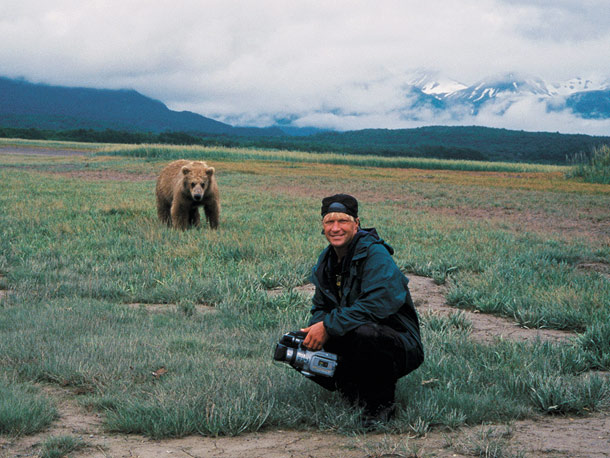
Perhaps the most famous of Herzog’s documentaries, Grizzly Man tells the tragic story of Timothy Treadwell; a passionate, maverick conservationist who was so concerned over the welfare of bears that he would spend summers in Alaska “protecting” them from poachers. Believing that he had befriended them, Treadwell filmed himself actively approaching and interacting with the bears for thirteen years, until they inevitably turned-on him. Using Treadwell’s own footage and interviewing the people that were closest to him, Herzog explores what led the man to carry out the work that he did and how it eventually ended with the death of himself and Amie Huguenard, his girlfriend at the time.
It is evident through Treadwell’s footage that he had a genuine love for all of nature and his sentimentality is something to admire. As he plays with foxes and gushes to his camera about the beauty of the bears, he is almost childlike in his affection for the natural world. His expeditions made him a minor celebrity through the 1990’s as he would frequently feature on the Discovery channel and even guested on The Late Show with David Letterman. Friends recount his caring nature and beautiful soul that caused him to carry out his work.
Although his heart was in the right place, Treadwell’s work was largely naïve and futile. Alaskan park rangers would repeatedly inform him that they had never had any cases of poachers hunting bears and that they were perfectly safe surviving independently. However, Treadwell’s obsession was just too strong to leave them alone. Unfortunately, nature is not so sentimental. On his thirteenth trip, after extending his stay in the wild longer than usual, Treadwell and Huguenard were viciously killed and eaten by a grizzly bear preparing for hibernation. We hear dreadful accounts of how the remains of the pair were found and Herzog listens to the footage that was recorded at the time of the attack, thankfully sparing us of the unimaginable ordeal.
Tough but compelling, Grizzly Man offers a fair reflection of Timothy Treadwell as a passionate but misguided man who lived his life trying to help that which he loved most.
4. Cave of Forgotten Dreams (2010)
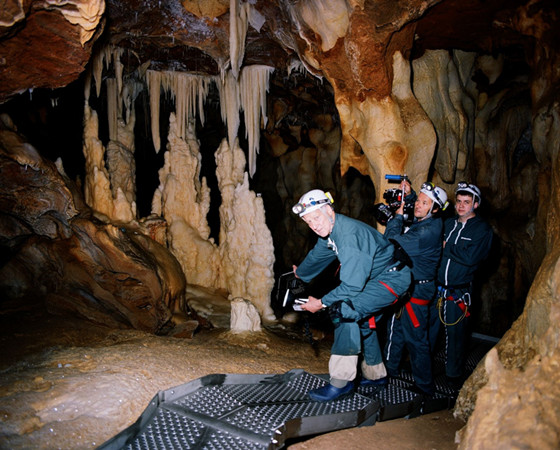
In Cave of Forgotten Dreams, Werner Herzog visits the oldest known cave paintings in the world in the Chauvet caves in France. Dating back thirty-thousand years, Herzog was granted rare access to document the ancient artworks in film and capture the magic that is preserved in the darkest depths of human history. Herzog is at his metaphysical height as the caves highlight humanities primal urge to create art and the universality of the human spirit throughout time.
Even witnessing the drawings secondarily through a screen, there is something innately in human nature than connects to them profoundly. It is surprisingly emotional seeing the primitive drawings of mammoths and wildebeest as scientists and experts hypothesise over their purpose and the conditions that they were drawn in. Pure expressions of human spirit, these markings were not made for profit or fame but to unite our early ancestors and share joy. Ironically, the artwork is now priceless and known all around the world.
No matter how far we think we have progressed and evolved as a species, these people had the urge inside of themselves that we still have today to need to create art and beauty and entertainment. Handprints are marked onto the side of rocks that have been untouched for thousands of years, waving through time to remind us that we are all one. There is genuine artistic talent in the drawings as they were able to express movement and direction in the animal’s legs while utilising the shape of the cave walls and the flickering of their torches to give the beasts the energy and dimensionality. As one of Herzog’s interviewee’s asserts, perhaps we have been wrongly names Homosapien and rather Homospiritulis is more apt.
Cave of Forgotten Dreams is a message from our ancestors that reminds us that to make art is to be human and that will always be of great significance. An enlightening experience, it highlights the magic of the human race and reaffirms that for all of our downfalls, for all of our greed and war and hatred, we are inherently truly magnificent.
3. Little Dieter Needs to Fly (1997)
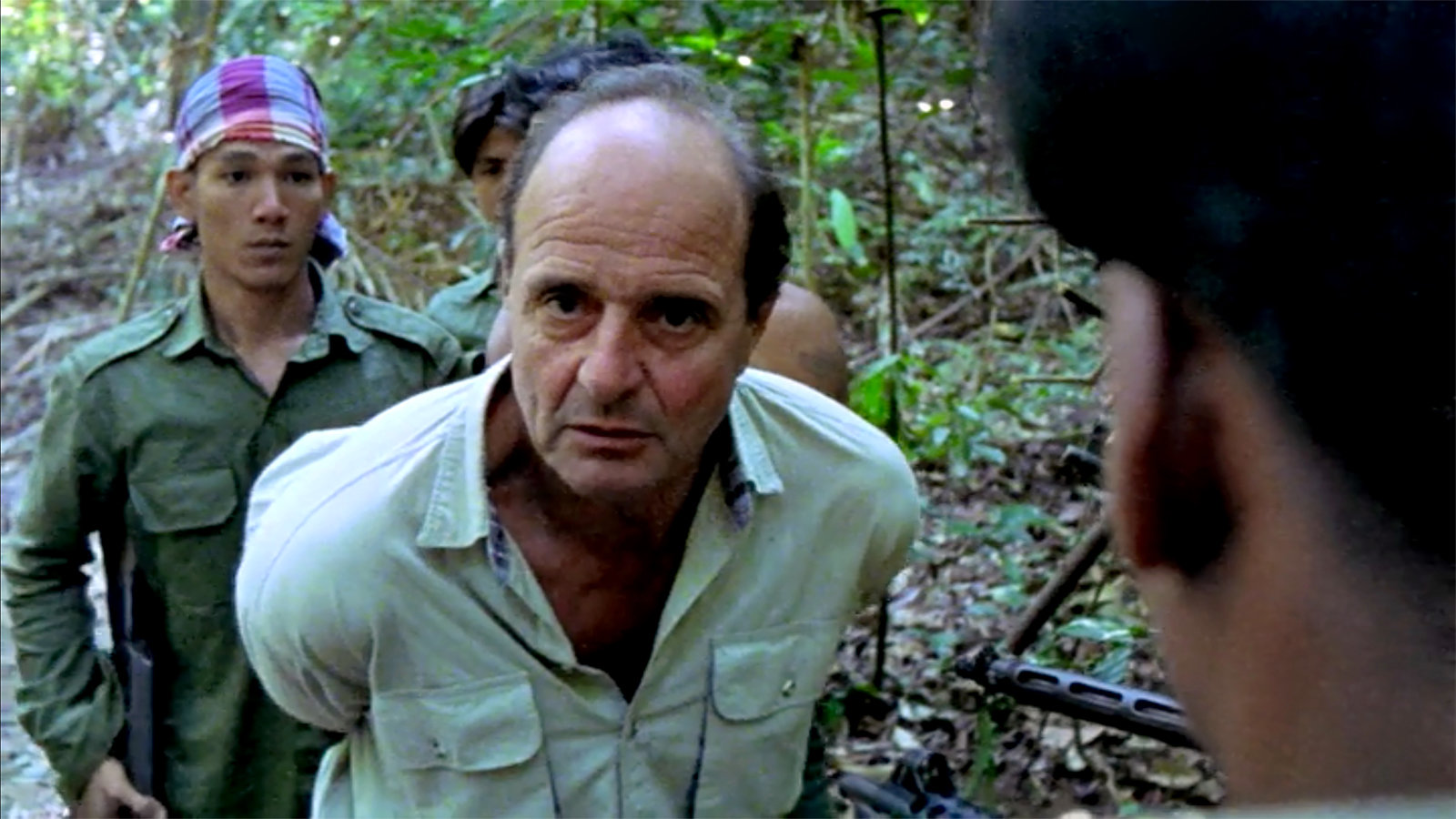
Little Dieter Needs to Fly is an inspiring documentary about the life of Dieter Dengler, a German-born American pilot who was shot down and captured during the Vietnam War. Dieter recounts the trials and tortures of surviving as a Prisoner of War and how he eventually managed to escape and make his way through the deep jungles of Laos and Thailand.
Beside from his extraordinary tales, it is abundantly clear why Herzog in particular would be interested in the unique and eccentric Dieter Dengler. Despite the trauma he has lived through, he exerts a very optimistic personality with a clear love for life. From the start, as Dieter describes how he knew he wanted to be a pilot when watching Allied planes bombing his small German village, it is evident that Dieter is a fairly unconventional character. Not many people would fall in love with the machine that is trying destroy you and everything you own. With a distinct and peculiar way of expressing things, it would be easy to assume Dieter to be a quite simple man but the story of his survival proves that he is extremely clever as he cunningly escaped his captors and made his way through the relentless jungle. Displaying supreme determination and resoluteness while having witnessed the horrific deaths of many of his friends, it is amazing that Dieter was ever able to tell of his trials to anybody.
Herzog later adapted Dieter’s story into the 2006 biopic Rescue Dawn which stars Christian Bale as the heroic pilot in which his trials and tribulations are recreated explicitly. However, this film is best experienced by having met its protagonist beforehand and learnt that everything you are going to see is completely true.
2. Lessons of Darkness (1992)
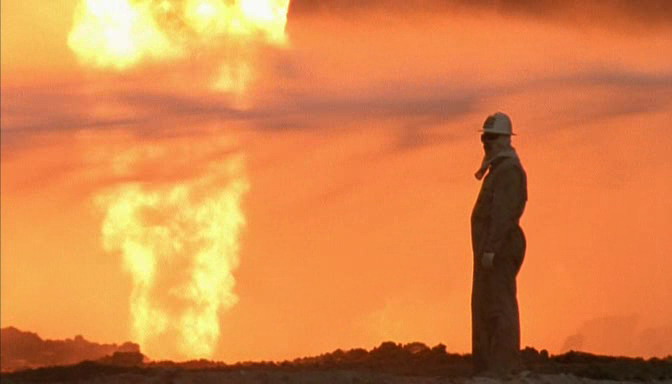
For Lessons of Darkness, Herzog captured footage of the flaming oil-fields that ravaged Kuwait after the Gulf War. In a style similar to his earlier Fata Morgana, Herzog presents the footage in largely unexplained, mesmeric manner with long stretches of the film dominated by aerial shots of the carnage underscored with his typical use of operatic music. Occasionally, Herzog narrates poetic, enigmatic lines over the scenes, evoking philosophical questions about the destruction that mankind has caused on its own soil.
Kuwait is a vision of the apocalypse as pitch-black oil floods the land and grey smoke coats the sky. Man’s red fire becomes mightier than the sun as it’s fumes completely block out any of the light, descending the landscape into a hellish nightmare of which the only colour comes from its blazing inferno. It is chaos of a biblical scale except the floods that have been sent are not from the wrath of God but the punishment of man against itself. Herzog floats over the images with a detached gaze, as if an alien looking down upon us and pitying what we are doing to ourselves. Traces of humanity remain scattered across the terrain but this land is unrecognisable as Earth as blown-out craters mimic that of the moon and the deep tracks are like the valleys of Mars. We have alienated our own planet.
The footage is intercut with interviews with local citizens whose lives have become devastated by the war and its lasting impact. A woman still struggles to speak after witnessing her two sons tortured to death while children actively choose not to, rejecting to participate in the world that has been so barbarically cruel to them. A whole nation left speechless. A mother describes the black tears that her children cries caused by the polluted air, an evocative image that not even the most brilliant mind could make up.
Brutal but important, Lessons of Darkness is both an experiential and metaphysical journey across a planet that has been ravaged by its own inhabitants and is certain to leave a lasting impact on any viewer.
1. Land of Silence and Darkness (1971)
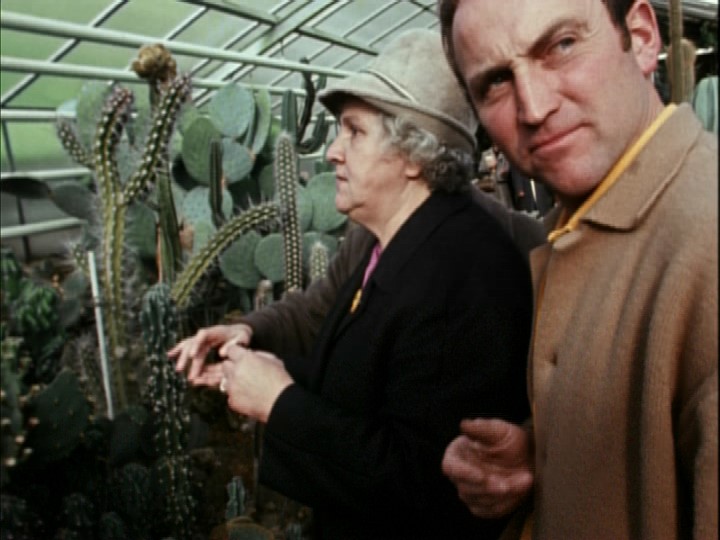
Land of Silence and Darkness is a sensitive examination of the life of deaf-blind people, specifically following Fini Straubinger, an elderly lady who has been deaf and blind since the age of fifteen. She guides Herzog through her daily experience including how she socialises with friends and the work she does to help others that struggle with afflictions similar to her.
We are introduced to Fini as Herzog’s questions are translated to her through the deaf-blind mode of communication of pressing on different parts of the hand. She describes some of her earliest memories she has before she lost her hearing and sight and your heart breaks for her as you cannot imagine how hard it must have been to go through what she has. You wonder if you even could. Fini is extremely social and full of life as she invites Herzog to various socials with other deaf-blind people where they are able to bond with each other and arrange sensory-based activities such as a trip to a petting zoo.
Slowly, Herzog introduces us to other members of the deaf-blind community including children who have been deaf-blind from birth who struggle to learn to communicate and understand abstract ideas. Thrown helplessly into this world, doctors and carers do their best to educate and bring happiness into these children’s lives. You feel immensely proud of them as they accomplish tasks that you had never even considered as privileges before such as being able to immerse yourself into water with the full knowledge of what is happening and the safety of it.
Finally, we are introduced to Vladimir, a twenty-two-year-old deaf-blind man from birth who was never taught to live with his condition. He struggles to walk, has no forms of communication and can only eat soft foods. We watch as Fini interacts with Vladimir as she tries to connect to him and help him understand the world. As she coherently and caringly plays with the young man, for a while you forget she is even deaf-blind herself. You feel foolish and embarrassed that at the start you questioned whether you could carry on living if you were to be in her position. There is always a meaning and joy to be got out of living and it is a privilege to be alive.